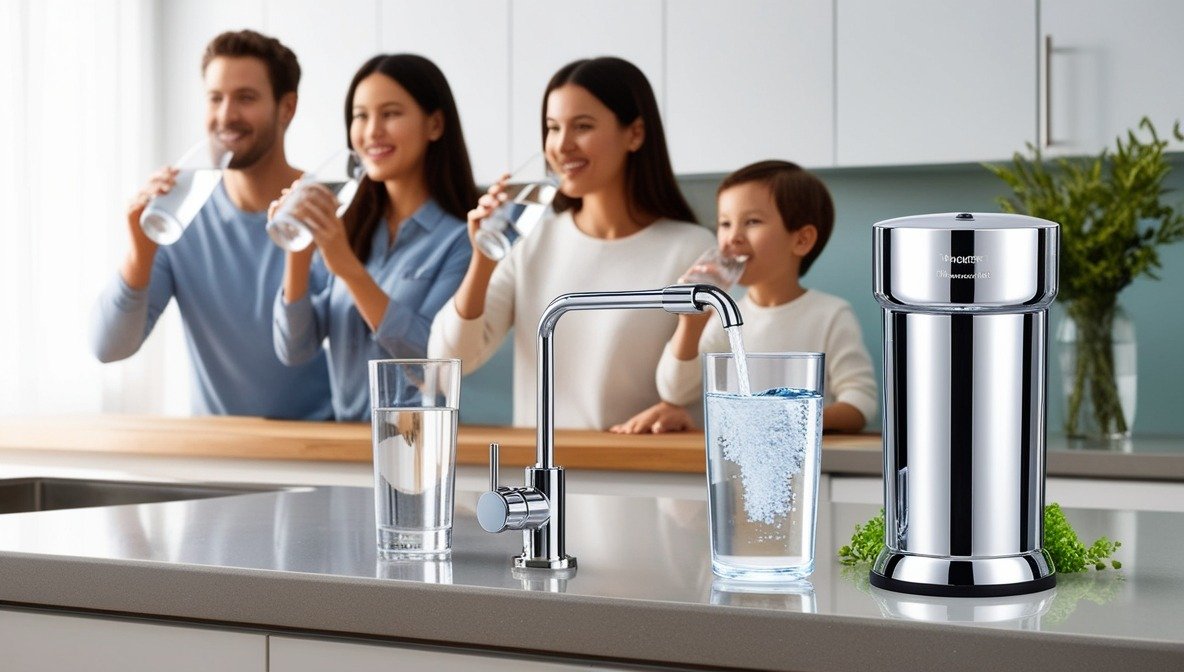
Nowadays, having access to clean and safe drinking water is crucial for our health and well-being. Did you know that many areas in the USA face water contamination issues? Whether you live in a large city or a rural area, your tap water may contain harmful substances that could put your health at risk.
This is where finding the best water filter for clean drinking water in the USA becomes crucial.
In this blog, we’ll explore why a good water filter is necessary, how to choose the right one, and which options are the best for clean and healthy drinking water.
Why You Need a Water Filter

Water pollution is an ever-growing concern in the United States, significantly impacting the quality of drinking water that millions of Americans rely on daily. While municipal water systems treat water using chemicals like chlorine and fluoride, these treatments may not be enough to remove all harmful substances.
In fact, dangerous contaminants such as lead, pesticides, heavy metals, and bacteria can still be present in your tap water, posing serious health risks to you and your family. According to the Environmental Protection Agency (EPA), over 20% of the U.S. population depends on private wells for drinking water, many of which are unregulated and often fail to meet the safety standards. This makes it even more critical to invest in a reliable and effective water filtration system.
Even though municipal water systems are designed to meet safety standards, they often fall short when it comes to removing certain pollutants. This makes having the best water filter for clean drinking water in the USA crucial for protecting your health.
A good water filter can eliminate a wide range of contaminants, ensuring that your water is pure, safe, and clean. Whether you’re using municipal water or well water, having the best water filter for clean drinking water in the USA can provide peace of mind, safeguard your health, and protect your loved ones from the dangers of contaminated water.
What to Look for in the Best Water Filter?
When selecting a water filter, it’s essential to consider several factors. Here’s what to look for to make sure you get the best water filter for clean drinking water in the USA:
Filtration Effectiveness:
Ensuring Comprehensive Contaminant Removal When choosing the best water filter, it’s crucial to consider its ability to remove a wide variety of harmful substances. The most effective filters should be able to eliminate common contaminants such as chlorine, lead, and heavy metals, which can impact your health over time.
Additionally, top-quality filters should address bacteria, viruses, and even microplastics, which are becoming a growing concern in today’s water supply. By opting for a filter that targets a broad spectrum of impurities, you ensure safer, cleaner drinking water for your home, contributing to better health and peace of mind.
Certification:
When choosing a water filter, make sure it’s certified by trusted organizations like NSF International or the American National Standards Institute (ANSI). These certifications guarantee that the filter has been tested for quality and safety, ensuring it works effectively to remove harmful contaminants.
If a filter is certified, you can trust that it’s been proven to meet high standards and will help provide clean, safe drinking water for your family.
Filter Type:

Different Types of Water Filters and What They Do
When it comes to water filters, there are a few popular types to choose from, each designed to tackle specific contaminants:
- Reverse Osmosis (RO): This type of filter is one of the best for removing harmful substances like heavy metals (such as lead and arsenic), fluoride, and bacteria. RO filters work by pushing water through a special membrane that traps these contaminants, giving you clean and safe water.
- Activated Carbon Filters: These filters are great for improving the taste and smell of your water by removing chlorine, chemicals, and volatile organic compounds (VOCs). If you want better-tasting water without any weird smells, an activated carbon filter is a good choice.
- UV Purifiers: Ultraviolet (UV) purifiers use light to kill bacteria, viruses, and other microorganisms in your water without adding any chemicals. This makes UV purifiers perfect for homes where microbial contamination is a concern.
Maintenance Made Easy:

How Often Should You Replace Filters? One of the most important things to consider when choosing a water filter is how often you’ll need to replace the filters. The best filters are not only effective but also easy to maintain. Look for systems that have long-lasting filters, so you don’t need to change them too often.
Some filters may need replacing every 6 to 12 months, while others can last longer. Make sure to pick a filter that’s affordable to maintain and won’t cost you a lot over time. This way, you get clean water without the hassle!
Flow Rate:
It’s important that the water filter doesn’t slow down the water too much. You want a filter that can clean the water without making it take forever to fill a glass or run a faucet. Look for a filter that balances strong filtration with a smooth, steady flow of water. This way, you get clean water quickly and easily, without any frustrating delays.
Ease of Installation:
Some water filters are simple to install and can be set up by homeowners without any help. However, some may require professional installation for proper setup.. Before choosing a filter, think about your needs. If you prefer an easy DIY installation, look for filters designed for quick setup. But if you’re okay with hiring a pro, you can pick filters that offer more advanced features.
The Best Water Filters in the USA

After looking at different factors, we’ve picked the best water filters you can find in the USA. These filters not only give you clean and safe drinking water but also come with helpful features that make them easy to use. Whether you need a simple solution for your home or a high-tech system, there’s a great filter out there for everyone!
Reverse Osmosis (RO) Systems
RO systems are often considered the most advanced water filtration option. They use a semi-permeable membrane to remove a wide range of contaminants, including lead, fluoride, and arsenic. While RO filters are more expensive and can waste water during the filtration process, they are highly effective for purifying drinking water.
Activated Carbon Filters
Activated carbon filters are a popular choice for many homes because they effectively remove chlorine, volatile organic compounds (VOCs), and unpleasant tastes and odors from water. These filters are affordable, easy to install, and work well to make your water cleaner and healthier. They’re a great option if you want better-tasting water without complicated setup or high costs.
UV Purifiers
UV purifiers use ultraviolet (UV) light to kill harmful bacteria and viruses in the water, making it safer to drink. They are a great choice for people worried about germs and microbes in their water. But, it’s important to note that UV purifiers don’t remove chemicals like chlorine or heavy metals, such as lead. Because of this, they work best when paired with other filters, like activated carbon or reverse osmosis systems, to give you the cleanest water possible.
Whole House Water Filtration Systems
If you want clean water from every tap in your home, a whole house water filtration system is a great choice. This type of system filters all the water that enters your house, making sure that every faucet, shower, and appliance uses clean, filtered water. It’s particularly helpful for people who get their water from wells, as well water often contains contaminants that need to be removed.
With a whole house filter, you can enjoy clean, safe water everywhere in your home, not just in the kitchen.
FAQs: Your Most Common Questions About Water Filters
Q1: How often should I change the filter in my RO system?
A1: Depending on the brand and water quality, you should replace RO system filters every 6-12 months. Check the manufacturer’s recommendations.
Q2: Are there any water filters that remove fluoride?
A2: Yes, reverse osmosis (RO) systems are one of the most effective methods for removing fluoride from drinking water.
Q3: Can a water filter remove bacteria and viruses?
A3: UV filters are specifically designed to kill bacteria and viruses. If microbial contamination is your concern, a UV purifier might be the right choice for you.
Q4: What is the best filter for removing chlorine taste from water?
A4: Activated carbon filters are excellent for removing chlorine and improving the taste and odor of your water.
Q5: How can I know if my tap water is contaminated?
A5: You can have your water tested through a local laboratory or use a home water testing kit. Many municipal water systems also provide annual water quality reports.
